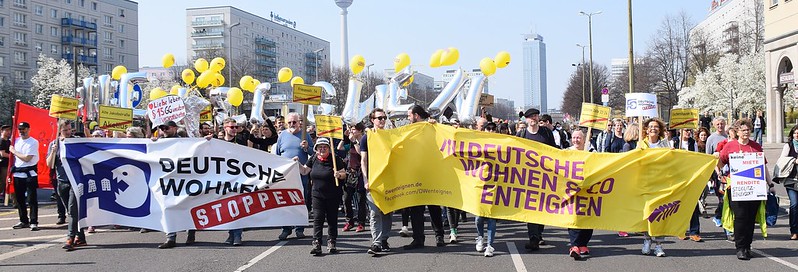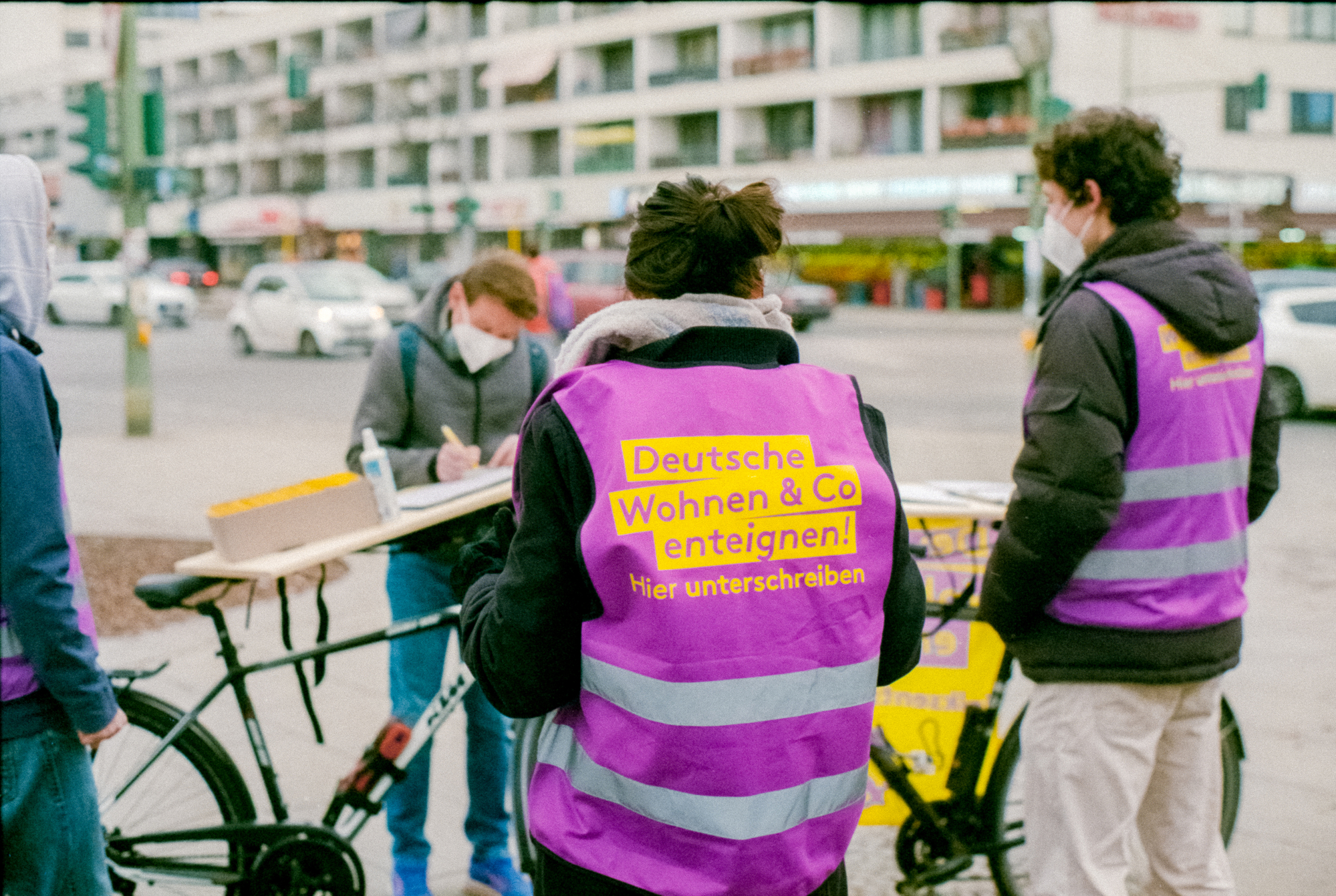
A Right To Fight For: Berlin’s Housing Referendum in Context
with Neelke Wagner
Based in Berlin, Neelke Wagner works as a scientific advisor for energy and climate policies. She has studied political science and philosophy in Berlin and Venice, has written a book about direct democracy in Europe, and is involved in a tenant protection initiative in her neighbourhood. We spoke to her to discuss about last September’s referendum in Berlin when a large majority voted in favour for the ‘socialization’ of large corporate landlords.
Interview by Yiorgos Papamanousakis
I’ve lived in London for the best part of the last 13 years, in Hackney, a part of the city which I love and now call home. Yet this feeling of home gets tested each time a friend moves away too often due to the ever increasing cost of housing; my area has seen the fastest rise in rents and house prices in the UK in the last decade. On hearing the news about the referendum result in Berlin I couldn’t help but feel a bit of envy of Berliners succeeding to challenge what lies at the heart of today’s housing crisis in major cities the world over. Some are even talking about the “end of privatisation of housing” in Berlin. What was your reaction to the result?
I would love to see an end of the privatisation of housing, but we’re still far from it. The referendum in Berlin has had a great success in 59,1% of the voters deciding in favour of the initiative. The adversaries of “DW enteignen” have tried their worst, and spent a lot of money, to stop the referendum. Big housing companies, big commercial associations, and last but not least the conservative and the liberal party in Berlin have fought against the referendum. That they lost, that a majority of Berliners agrees that housing is a common good and not an object of private profit-maximising, is a great step forward. At the same time, it is just a first step. The problems of housing run much deeper than the market power of real estate companies that own more than 3,000 flats in the city (which represent appr. 12 percent of Berlin’s housing market and are the ones whose housing units will be socialized). The referendum won’t end rising rents, legal loopholes in renter’s rights, evictions, or gentrification. We’ve made a big step forward, but the fight must go on.
What does the housing situation look like in Berlin and how has it changed over the past years?
The situation has worsened a lot in the past 20 years. Berliners still pay much less than people in other German cities as Munich or Hamburg, let alone London or Paris. But the rise in rent has been exceptional and much faster than the rise in income, and Berliners haven’t been used to a capitalist housing market for long. In the GDR, housing was provided mostly by the state and rents were very low. Western Berlin, where 87% of the people lived in rental apartments, had a strong public housing sector and a renter friendly legislation. For both parts of the city, 1989 changed almost everything. On January 1st, 1990, the federal government abolished non-profit housing and rent control. This started a new era of capitalist housing in the newly united city. Thanks to the missing economic upturn after the unification, this didn’t generate major problems at first. Berlin was still a shrinking city in the 2000s and renting was easy. Many houses in the east were still waiting for their restitution to the owners from before the war, or belonged to the state who didn’t care. They were poorly maintained and many were squatted. In the west, squatting had become a sort of radical housing policy about ten years earlier. People began squatting houses which were left in decay for speculative reasons while many people desperately needed a roof over their heads. The squatters called their practice “instandbesetzen”, a combination of “instandsetzen” (to repair) and “besetzen” (to squat).
Around the year 2000, almost everyone could be sure to find a new affordable place in Berlin that fit their needs – if they were willing to accept low standards like coal heating and a toilet outside the flat. This has changed dramatically. In only about 15 years, the majority of old houses in the city centre have been renovated, often by squeezing out the existing tenants and renting the flats to new tenants with more money. People who still have an old contract and a low rent, often live in constant fear that their house could be next. Rents have doubled over the last ten years, and newly built houses are often condominiums not intended for the rental market or are asking very high rents.
Rising rents and a housing shortage have led to overcrowded flats. Grown-up kids can’t move out because they can’t afford the rent of a place on their own. People who have children keep their little flat in which they used to live as a single person because they can’t find a new place in their neighbourhood. Friends and relatives move in and sleep on the couch because they can’t find their own place to live. People can’t pay the rent anymore and get evicted… Even during the pandemic year 2020, 1,700 evictions were executed in Berlin.

One of the big demonstrations for tenant’s rights and housing as a human right, April 2019, in Berlin. Source: Uwe Hiksch
What has happened between 2000 and today that has created this situation?
Since 2011, Berlin is growing again, by about 50,000 people a year. This has of course added to the housing crisis. But mostly, the problem is neoliberalism, as in most parts of the world. The Berlin senate has played an especially inglorious role, with its complete failure in dealing with the 2008-2009 banking scandal in any reasonable way. In 2001, a construction of banks, real estate funds and bogus firms collapsed, and left Berlin with a load of bad debts and void cheques. This scandal involved several high-level politicians of the then-ruling parties SPD and CDU. Instead of letting the bogus system crash and use the valuable remaining parts of it, Berlin took over the whole debt of about 17 billion euros. In order to cover at least part of the debt, it then restructured and mostly privatised its real estate companies, and sold much of the public owned real estate. Approximately 300,000 flats and more than 10,000 development sites have been transferred from public to private ownership. Berlin then received 5 billion euro for real estate that is worth 50 billion euro today.
This sell-out has helped the big players of Berlin’s housing market like Deutsche Wohnen (“German Housing“) growing to their current market power. Deutsche Wohnen is one of the biggest real estate companies in Germany, and it has a long and infuriating history of willfully disregarding tenants’ rights and maximising the profits of its shareholders regardless of the consequences. The rents have increased rapidly after privatization, but the standard of the residential units is deteriorating. That’s why the campaign has been called “Deutsche Wohnen & Co. enteignen”. The company symbolizes everything that can go wrong on a capitalist housing market. But of course they are not the only real estate company behaving this way.
The campaign has been fighting for what has often been translated in English as the “expropriation” of big corporate landlords, so landlords who own more than 3000 homes. But this isn’t exactly, or only, expropriation in the sense of the state simply force-buying housing stock, is it? What does the campaign, and now the result of the referendum, call for?
The campaign isn’t as radical as the title may suggest. It asks for socialization in a sense that the German constitution specifically allows. Article 15 of the constitution says: “Land […] may be transferred to common ownership […] for the purpose of socialization”. The initiative suggests that the flats will be transferred into the ownership of a new public company to be established. Several legal assessments, among others by the Bundestag (German Parliament) and Berlin House of Representatives, have concluded that the demand of the referendum is legally feasible.

One of the big demonstrations for tenant’s rights and housing as a human right, April 2019, in Berlin. Source: Uwe Hiksch
What enabled this campaign to succeed? How was such mobilisation achieved?
80% of Berliners rent their flat, so rising rents and threat of eviction affect a vast majority of the inhabitants here – not only poor people, or newcomers to Berlin, or large families, but almost everyone, no matter their political, economic or social background. Prior to the referendum, many local tenants’ action groups already existed, often because of a local threat, for example a high-end real estate project in the neighbourhood, the selling of houses, or the poor maintenance of houses owned by big real estate firms. In these groups, people from all social classes came together – not only the all-radical punks or those from the academic middle class. People have been connecting, gathering and organising themselves with their neighbourhoods and districts and city wide, and some have built strong relationships to each other. They have supported each other all over the city. For years they have been discussing what could be done to improve the housing situation, so they had a thorough and critical analysis of the situation. When the idea of the referendum was born, it found a fertile ground to flourish on. The campaign didn’t come out of the blue, and it succeeded not only because of the excellent work of its organizers, but because so many people in the city were already well aware of the housing crisis, that the state had given up providing decent housing and that big investors were trying to generate double-digit returns from their rents.
An extra push was given to the campaign with the constitutional court’s judgment against the Berliner Mietendeckel (rent cap), which had cut rents over a certain amount. This Mietendeckel immediately cut rents for about 340,000 flats in Berlin and froze the rent of a million others. When this law was rejected by the constitutional court, people saw the referendum as a necessary next step: If we can’t reduce by a rent cap, we’ll have to go a step further and take at least the flats of the biggest players back under public ownership.
Is the referendum binding? What are the learnings from the successes and failures from previous people-led democratic initiatives?
The referendum isn’t binding, because it hasn’t proposed a bill that could, if approved on the ballot, enter into force directly after the vote. Instead, the initiative decided to call on the Senate of Berlin to “initiate all measures necessary to transfer real estate into common ownership”. The Senate is now obliged to present such measures, but has some margin to decide which measures to choose. The initiative chose this way because in 2015, the first attempt of a rent referendum, the “Mietenvolksentscheid”, proposed a bill that was considered partly illegal and so the initiative failed. This time, the Senate has to guarantee that the proposals are legal and effective.
As you just mentioned, the recent attempt by the local government to cap rents in the city was subsequently challenged in the constitutional court which ruled against it and was later cancelled. Can something similar happen now? Is there a stronger legal basis for socialising housing?
It is important to note that the rent cap has been cancelled not because this kind of law is anti-constitutional, but only because this kind of renting policy has to be made at federal level. The court didn’t rule against a rent cap or any more radical tenants’ protection measures. The referendum has a strong legal basis, but its success depends on politics. Berlin’s new mayor Franziska Giffey has repeatedly said that she is against the socialisation. It is possible that she’ll present proposals which don’t fit the expectations or are illegal, so she can say “Well, I tried!“ and that’s it with the referendum. Another option: They’ll propose inadequate measures that don’t execute the will of the referendum. These kinds of strategies can be employed to postpone the fulfilment of the referendum as long as possible. Giffey’s coalition partners, the green party and the left party, who have supported the referendum, and the housing movement itself, will have to ensure that this won’t happen.
Of course, the opponents of the initiative will try everything to stop it. They will sue, they will spread misinformation, they will try to threaten everyone with horror scenarios of what might happen if capitalism is challenged. Even right now they most likely stand before every Green Party or Social-Democrats office, trying to convince them that socialisation is bad.
Another hurdle is the price. If Berlin has to compensate the market value, expropriation may end up being a present to the real estate companies, because real estate prices have been skyrocketing. The initiative highlights that Article 15 of the constitution would allow a compensation well under the market value. Several legal assessments back that opinion. If true, the compensation could be refinanced out of the rental income and neither the city nor the tenants would have to pay additional money. But if market prices have to be paid, the new public company who’ll take over the expropriated flats would face a major financial burden: Either they’d have to raise rents drastically, and tenants would end up paying the speculators’ profits anyway, or the state will have to subsidize them. Neither is what the initiative wanted, who promised that socialisation won’t cost money and that rents won’t rise anymore.
In any case, if expropriated for a compensation beneath market value, the big real estate companies as well as their political allies will sue against the socialisation. This may well take years, and it is unclear if they can win.
The campaign movement has already drafted legal texts, their version of a new law socialising housing. Franziska Giffey, the mayor of Berlin, previously opposed to the socialisation of housing, has said that the referendum result needs to be respected. Do you think activists and the local government could collaborate on this?
I think they have no choice other than to collaborate. The Senate, because it faces a well-organized movement that has just won the probably best-known referendum ever. The initiative, because they need to convince the Senate to present a reasonable plan to fulfill the referendum outcome.
We have reluctantly become accustomed to housing being provided by the ‘free market’; housing as a commodity. The result of this referendum and the discussions around the campaign are in this sense so inspiring; inspiring to re-imagine an economy where a society’s universal needs and public goods are excluded from profit-making. What do you think are the challenges in such a transition?
Yes, for me, it is inspiring and I hope, for many others, too. The referendum really challenges the profit-orientation of the housing market, despite all the efforts of real estate lobbyists to misinform, discourage and gaslight people. This is beautiful, and I hope that it will inspire people in Hamburg or Munich, where referenda are also well-established and could be used in a similar way. Other cities don’t have this instrument. They’ll have to find another way.
The big challenge is, simply put, the beast will fight back. The big companies won’t stand aside and look while their assets are being socialized. They have excellent relations to politicians and have managed to get their own bills through legislation, and they are very successful in these undertakings. We have to be very aware that winning a referendum, or winning elections, or big demonstrations, won’t change anything if we aren’t ready to fight these big players.
Do you see this happening in other areas apart from housing?
The climate movement is also using the instrument of a referendum. An initiative to make Berlin climate neutral by 2030 has just commissioned the signatures needed for the first step of a referendum. An initiative for reducing car traffic in the city centre has done so earlier this year. Referenda are a well-known instrument in Berlin and they are regularly used. To win a referendum, you need a strong movement that backs the idea and is rooted in the city society. The other way round, referenda are a good thing if a movement wants to bundle its energies to achieve a certain goal. In both ways, they make city politics more accessible and more effective for people who don’t align with classical political groups.

Neelke Wagner, photo by Edda Dietrich
Obviously, they’ll have to make sure that the outcome of the referendum will be fully respected and implemented. And we have lots of other issues around housing: the transformation of rental flats into freehold flats, evictions, the need for climate-friendly renovation versus affordable rent. Plus, many of the local groups that have supported the initiative have their own issues that motivated them to form a group in the first place: a change of ownership in their own house, poor maintenance and bullying by their landlord, or gentrification of their neighbourhood. These problems remain, even if the socialisation will be successful – and they still need to be addressed. Last but not least, people have worked very hard for the referendum in their free-time, and many are exhausted and need some time off politics. I’m confident that Berlin’s tenants’ initiatives will stay strong and fight for their rights to the city, and I very much hope that this fight will be easier when the socialisation has been put into effect.
Volume 5, no. 1 Jan-Jun 2022

